W.S.L.C.
WSLC is now offering naturalization legal aid
First-of-its-kind program will help legal permanent residents gain citizenship
By SARAH TUCKER
Special to The Stand
YAKIMA (Aug. 6, 2020) — As COVID-19 swept Washington in March and April, agricultural workers in warehouses across Yakima and the Valley walked out of dangerous workplaces, demanding hazard pay, Personal Protective Equipment, protection from retaliation for raising safety concerns, and basic respect on the job. These workers, doing the essential work of feeding Washington, faced an unprecedented level of risk: a largely immigrant workforce, with fewer labor protections than many, already underpaid and overworked, in the midst of a global pandemic. Still, these brave working people walked out.
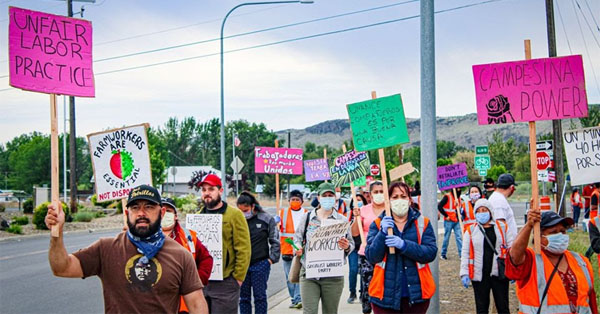
Many of the striking workers were without the protections of union membership or citizenship, but the risk paid off. Each of the strikes in May ended with employers meeting the safety demands of striking workers and a number of strikes also resulted in hazard pay for workers. In a town where working people are systemically disenfranchised, the pressure caused by a global pandemic has illuminated inequities; it’s also demonstrated how much power working people united hold in a time of crisis.
Against this backdrop, the Washington State Labor Council, AFL-CIO is expanding its programming for building power for working people by launching a one-of-a-kind naturalization legal services program, providing legal aid to union members who are legal permanent residents seeking citizenship.
Dulce Gutiérrez, the WSLC’s Union, Community & Naturalization Organizer, has trained for the past three years to provide these critical legal aid services in the Yakima Valley. She spoke with The Stand about the importance of citizenship work, and the challenges.
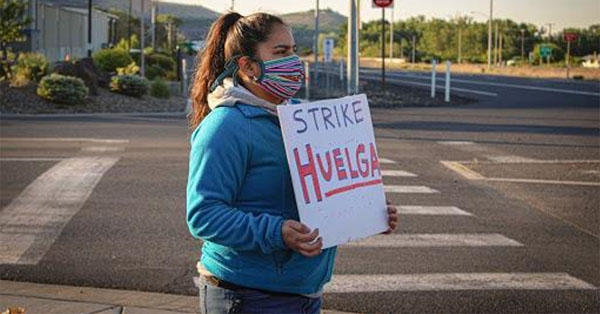
Dulce grew up in Yakima, and she has seen firsthand the consequences of citizenship being inaccessible.
“A large segment of the labor force here in Yakima County is made up of immigrants, many of whom are undocumented entirely,” Dulce said. “That causes a ripple effect in a number of areas. First and foremost it’s unlikely and very rare to see laborers in the agricultural industry assert their labor rights. It’s also extremely difficult for workers to report violations of wage theft, or any sort of undercut of pay.”
Citizenship is a labor issue
Helping working people access citizenship is fundamentally a labor issue. As Dulce explained, “When you have different factions within a population that is already vulnerable, then amongst themselves they are not organized. And you eventually have a competition among workers towards the bottom, a race to the bottom: who can work the most for the least amount of money.”
Agricultural workers face dangerous health disparities linked to hazards on the job; respiratory diseases and illnesses are linked to drifting, for example.
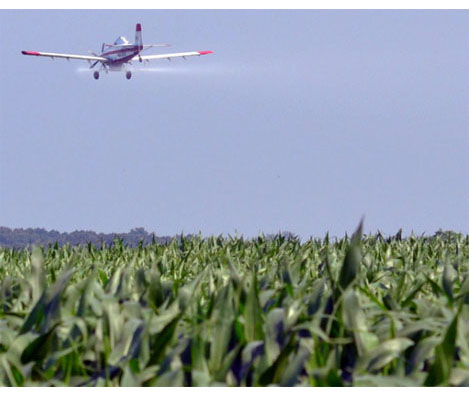 “Drifting is when airplanes drop chemicals on fields, and although it is illegal now to do it in a field where workers are at, it’s still not illegal to do it in a field next to where workers are at,” Dulce said. “So on any day where the wind is blowing, you have chemicals and pesticides floating on to the workers next door.”
“Drifting is when airplanes drop chemicals on fields, and although it is illegal now to do it in a field where workers are at, it’s still not illegal to do it in a field next to where workers are at,” Dulce said. “So on any day where the wind is blowing, you have chemicals and pesticides floating on to the workers next door.”
This practice, likely linked to the cancer and respiratory illness clusters found in agricultural areas across the United States, is clearly unsafe; in the midst of a global pandemic targeting the respiratory system, it’s actively violent. But without the protection of citizenship, it’s extremely difficult for workers to advocate for themselves.
“If [agricultural workers] report labor violations, oftentimes they are never given an opportunity to work in that farm ever again,” Dulce said. “H2A workers will never be invited back to the United States [to work] if they make a complaint. Undocumented people are oftentimes retaliated against and ICE is called on them, so they have little to no ability to organize themselves without having severe retaliatory actions taken against them.”
Dulce has seen this first hand.
“One of the biggest barriers these workers face is their status and their lack of [citizenship],” she said. “Obtaining citizenship is one of the pillars to improving not only their ability to advocate and assert their rights, but also overall improve quality of life.”
The need for naturalization services
Access to citizenship is clearly important, but historically there have been few affordable options for assistance with the naturalization process. In Yakima and surrounding areas, there are organizations doing this crucial work – like the Northwest Immigrant Rights Project (NWIRP), la Casa Hogar, and OneAmerica. But the need surpasses the available resources, and is often urgent; in a global pandemic, ICE continues to separate families, using Yakima airport for deportation flights.
Private attorneys are often prohibitively expensive, and for many legal permanent residents without criminal records there’s no reason that assistance with naturalization should cost so much.
“Ethical attorneys often turn folks [in this situation] away,” said Dulce. “They won’t even accept their money and provide the service because they feel like they should be focusing on immigrants who are already in the detention center or in court proceedings.”
NWIRP has a long waiting list and is 30 miles outside of Yakima in Granger, and while OneAmerica runs citizenship days, there’s only one program in Yakima per year. The only Yakima provider is La Casa Hogar, a non-profit community center that runs citizenship classes and offers naturalization assistance, prioritizing assistance for class attendees.
“What we found is that legal permanent residents were waiting three, four, sometimes up to six months in line to be provided with a consultation and assisted with their naturalization application,” Dulce said. And for many union members who are legal permanent residents, the only barrier to starting the naturalization process is this wait time. “A lot of union members know English, they know some of the educational parts they have to pass for the exam,” said Dulce. “And oftentimes, they have the means to pay for their application, so they’re not waiting for the waiver. They’re ready to go, but they don’t have the service made available to them.”
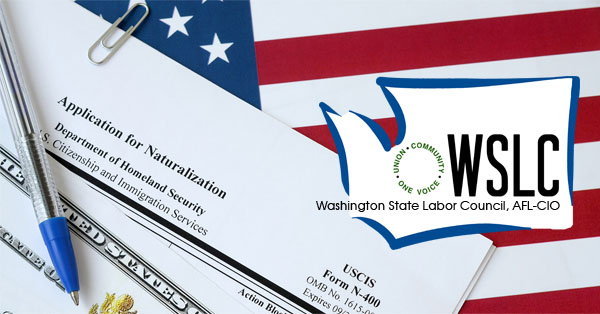
This is the gap that the WSLC naturalization legal services program seeks to fill. Partnering with a major community center in Yakima County, Nuestra Casa, the WSLC will be offering legal aid to legal permanent residents, prioritizing union siblings seeking citizenship.
“It’s super exciting, providing a brand new avenue for resources and legal aid to union members specifically that they really are not getting anywhere else, and will have immediate access to,” Dulce said.
Securing citizenship for working people offers protection on the job, but the effects of naturalization reach far beyond the jobsite. For Dulce, this work isn’t just a pathway to citizenship; it builds political power for all working people.
“We have the ability to not only help immigrant workers become citizens now, but we then also have the access to help them get registered to vote,” she said.
This is significant, especially in a town like Yakima, where Latinx folks make up half of the population, yet prior to 2015, there were no Latinx elected officials. Political power is predominantly held by ranchers.
“What we’ve seen in Yakima County is that you have ranchers that have the capital power to do things like union busting, or lobby and spend money on trying to create policies that are anti-labor,” Dulce said. With a largely immigrant workforce, it’s difficult, sometimes impossible, for working people to advocate for themselves and their families.
Helping working people access citizenship strengthens our movement. The Economic Policy Institute predicts that the working class will be minority-majority by 2032; naturalization legal aid is part of ensuring that the WSLC represents all working people. For Dulce, there’s tremendous promise in this work.
“Eventually people will end up thinking of unions as another way they are able to become citizens,” she said. “Just like people think of unions as a layer of protection from being exploited by their bosses, I hope working people one day think, ‘unions care about citizenship, so I’m going to go to my union and I’m going to get my citizenship with the union’s help’.”
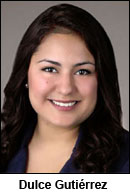 Dulce Gutierrez is the WSLC Community & Naturalization Organizer based in Yakima, WA. Her work is partially funded by an AFL-CIO Solidarity Grant, recognizing the importance of advocacy for immigrant workers and citizenship for the entire labor movement. Dulce was elected to the Yakima City Council in 2015, one of the first Latinx women to serve on the council. You can read more about the specifics of the WSLC’s Naturalization Legal Services program at the WSLC website, including participation requirements, cost, how to make an appointment, and health & safety guidelines during COVID-19
Dulce Gutierrez is the WSLC Community & Naturalization Organizer based in Yakima, WA. Her work is partially funded by an AFL-CIO Solidarity Grant, recognizing the importance of advocacy for immigrant workers and citizenship for the entire labor movement. Dulce was elected to the Yakima City Council in 2015, one of the first Latinx women to serve on the council. You can read more about the specifics of the WSLC’s Naturalization Legal Services program at the WSLC website, including participation requirements, cost, how to make an appointment, and health & safety guidelines during COVID-19
Sarah Tucker is the WSLC’s Executive Assistant to the Secretary Treasurer.





